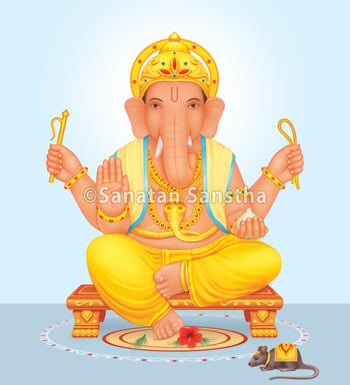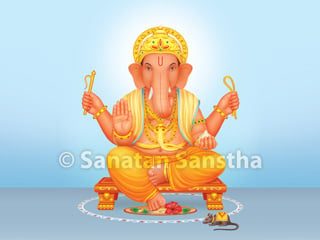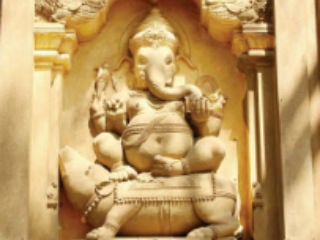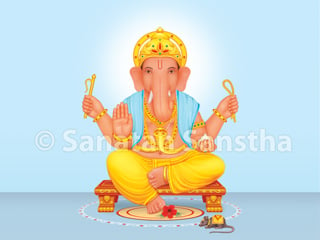
Each Deity is a specific Principle. Greater the similarity of the Deity’s two-dimensional form (a picture) or three-dimensional form (an Idol) with the Deity’s original form, higher will be its ability to attract the Deity’s Principle. Greater the presence of the Deity Principle in the form, greater will be the possibility of early awakening of spiritual emotion in the worshipper. Since greater amount of the Deity’s waves are emitted by such a form, the atmosphere, too, will become sattvik. With this view in mind, Sanatan sanstha has made pictures, idols and Name-strips of Deities as per the science of Spirituality, after due research of the science of subtle vibrations under the guidance of H.H. Dr. Jayant Athavale.
Sanatan’s sattvik picture of Shri Ganapati
Picture based on subtle-knowldege depicting the
subtle characteristics of Sanatan-made sattvik picture of Shri Ganapati

A. Positive vibrations
Positive vibrations in the picture based on subtle-knowledge is 2%’ – H.H. Dr. Athavale
B. Proportion of vibrations
Proportion of vibrations in the picture based on subtle knowledge are as follows – Divine Principle 2%-3%, Anand 4.75%, Chaitanya (Divine consciousness) 4% and Shakti (Divine Energy) 1%.
C. Other aspects
1. Perceiving more ‘liveliness’ in the Sanatan-made picture of Shri Ganapati
While looking at the Sanatan-made picture of Shri Ganapati, I perceived that the picture was more ‘alive’ than other pictures of Shri Ganapati. I felt that Shri Ganapati’s eyes, tusk and ears were moving.
2. Perception of the picture as alive, as per the intensity of spiritual emotion of the individual looking at it
Depending on the level of spiritual emotion of the artist or the devotee worshipping the Deity, the picture comes to life. The picture looks alive as per the intensity of spiritual emotion of the individual looking at it.
3. What is meant by the picture coming to life ?
The picture coming to life means the Deity’s Principle comes in the sagun (Materialised) state from the nirgun (Non-materialised) state. The Deity’s picture fades in due course and becomes white, which means that the Deity’s Principle goes from the sagun state to the nirgun state. A two-dimensional picture becoming three-dimensional is also a sign of the picture coming to life. So is the case with this picture. During the critical times of the Kaliyugwithin the Kaliyug, the Deities descend to the level of saguntattva, that is, they actually come into a sagun state. In other words, they Incarnate. Its practical example is the Deity’s picture becoming sattvik in a higher proportion and appearing as if alive.
4. It is difficult to depict the major vibrations, since vibrations are emitted by every part of Sanatan-made picture of Shri Ganapati
Various vibrations from every organ and ornament of Shri Ganapati in the Sanatan-made picture are active at the same time. Hence, it is very difficult to depict which major vibrations are active in the picture; for example, the vibrations of Shakti from the weapons of Shri Ganapati, vibrations of Anand from His modak etc.
5. While looking at the Deity’s picture, perceiving the change in vibrations of the picture as per the Deity’s Principle
While looking at the Sanatan-made pictures of Deities, changes in the vibrations of the picture are perceived as per the Deity’s Principle; for example, when we look at the picture of Deity Shiva for some time, it seems to fade and then disappear, since there are vibrations of Dissolution in the picture. Since the proportion of Anand in Shri Ganapati’s picture is higher, upon looking at it for some time, the form of Shri Ganapati becomes invisible and only the pink colour of Anand is seen spreading everywhere.
6. Nirguntattva is more in Sanatan-made Name-Strips of Deities
Since a picture is more sagun than a letter, the nirguntattva in Sanatan-made Name-strips of Deities is in a higher proportion than their pictures.
7. Sanatan-made picture of Shri Ganapati helps enhance spiritual emotion
Sanatan-made picture of Shri Ganapati helps enhance the spiritual emotion of the individual who worships Shri Ganapati.
8. Difference between artistry and sattvikta
Since art is used only for the sake of artistry, the proportion in which Divine vibrations are attracted to that artifact is less. Since the proportion of vibrations of ego is higher in such artifacts, the proportion in which distressing energy vibrations is attracted is also higher. Hence, the proportion of sattvikta in such pictures of Deities is less. Conversely, the combination of artistry and sattvikta gives rise to divinity in the artifacts. That is why artists should make artifacts with utmost spiritual emotion.’
– Ms. Priyanka Lotlikar, (Jyeshtha Krushna paksha Navami, Kaliyug Varsha 5113 [25.6.2011])
Spiritual experience of a seeker
about Sanatan’s sattvik picture of Shri Ganapati
Shri Ganapati caressing seeker’s head with His trunk after
expressing gratitude and paying obeisance to the picture of Shri Ganapati
On 24th April 2002, I was in Sanatan’s Ashram at Sion, Mumbai. Around midnight, a thought arose, ‘I have been told to chant Shri Ganapati’s Name 5000 times a day; but today, I could not complete the target. Hence, I must pay obeisance to Shri Ganapati and seek His forgiveness’. Then I bowed and placed my head on the ground in front of the picture of Shri Ganapati. For a moment, I forgot my existence and did not seek forgiveness as I had wished; but soon I realised that Shri Ganapati Himself was caressing my head with His trunk. My feelings were akin to those of a child whose mother moves her hand affectionately over the child’s head. For a long time, I just did not feel like raising my head. As long as my head remained touching the ground, the trunk stroked my head’. – Mrs. Nisha Shah (nee Hozge), Gadan, Belgaum, Karnataka.

 Maghi Shri Ganesh Jayanti 2025
Maghi Shri Ganesh Jayanti 2025 Sankashtnashan Stotra
Sankashtnashan Stotra Having spiritual emotion while drawing pictures of P.P. Bhaktaraj Maharaj and P.P. Dr. Athavale
Having spiritual emotion while drawing pictures of P.P. Bhaktaraj Maharaj and P.P. Dr. Athavale Signs of ancient Hindu culture left behind in foreign lands
Signs of ancient Hindu culture left behind in foreign lands Some mantras to be recited when worshipping Shri Ganesh with specific objectives
Some mantras to be recited when worshipping Shri Ganesh with specific objectives